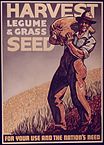Learning is like Bermuda grass

John Cormier uses rhizomes as a metaphor for learning. Rhizomes are plants, like Bermuda grass, that have a network of roots with no main root. Rhizomes, he contends, are like learning in that they grow in all directions from any point, by experimentation, and regardless of breakage. I think it’s an interesting analogy.

Couch grass by John Tann is licensed under CC BY 2.0
Cormier’s explanation
Here’s a video where he presents this idea of rhizomatic learning:
This is the structure of his argument:
- Teaching prepares people for uncertainty.
- When there is no answer, the community can provide ‘the curriculum’ of learning.
- A model for learning in times of uncertainty is the rhizome.
- This model works best for complex issues (where ‘complex’ is defined as in the Cynefin Framework).
- People need to be responsible for their own learning and for the learning of others.
Using this metaphor for learning related to complex issues
I think rhizomatic learning is an especially good metaphor for how we learn informally, in the workplace or just in our everyday lives. At about the 10-minute mark in the video, Cormier says that this model works best for complex issues — that is, issues that fall in the upper-left quadrant of the Cynefin Framework:
Cynefin model by Dave Snowden is licensed under CC BY-SA 3.0
The interesting puzzle is, can we effectively implement this type of learning in a formal setting?
The role of instructional design?
Cormier argues for having courses with no set curriculum (‘the community is the curriculum’). With no set curriculum, he further argue that we should stop trying to measure learning — use robots to measure engagement and connections, and trust teachers to decide if people are ‘getting it’. Even though I agree that our informal learning follows his rhizome metaphor, I can’t imagine asking managers in a corporation to fund a project with no set course and no measurements.
He’s not alone in this line of thinking though. Downes, Siemens, and Kop align with Cormier in their connectivist theories. Here’s a quick look:
- Stephen Downes: “In the ‘connections’ approach, personalization typically means less: fewer rules, fewer constraints. You need to grant the learner autonomy within the environment” (Downes, 2007, p. n/a).
- George Siemens: “The pipe is more important than the content in the pipe” (Siemens, 2005, p. n/a).
- Rita Kop: “There is no overarching educator present to guide learners, to challenge their ideas and beliefs, or to help in aggregating information and in understanding the media and the way they represent information” (Kop, 2011, p. 23)
I find this uncomfortably pitched against the tremendously low retention rates in MOOCs. One study looked at 76 MOOCs (xMOOCs and cMOOCs) and found that overwhelmingly the principles of learning design are not being followed at all (Margaryan et al., 2014). I wonder if there is a connection? It might be that rhizomatic learning is somewhat like Wenger’s explanations of communities of practice — we find it is true, and yet we also find that the ones that are designed are likely to fail (Wenger, 2010, p. 11).
As a final note, Cormier is working on a book . Perhaps he answers some of these questions.
References
Downes, S. (2007) ‘What Connectivism Is’, Half an Hour, 3 February [Blog], Available at http://halfanhour.blogspot.co.uk/2007/02/what-connectivism-is.html.
Embracing Uncertainty — Rhizomatic Learning in Formal Education (2012) YouTube video, added by Dave Cormier [Online] Available at https://www.youtube.com/watch?v=VJIWyiLyBpQ.
Jones, C. (2004) ‘Networks and learning: communities, practices and the metaphor of networks’
Kop, R. (2011) ‘The Challenges of Connectivist Learning on Open Online Networks: Learning Experiences during a Massive Open Online Course’, International Review of Research in Open and Distance Learning, vol. 12, no. 3, pp. 19-37 [Online]. Available at http://www.irrodl.org/index.php/irrodl/article/view/882/1689.
Margaryan, A., Bianco, M., and Littlejohn, A. (2014) ‘Instructional quality of Massive Open Online Courses (MOOCs)’, Computers & Education, vol. 80, pp. 77-83 [Online]. DOI: 10.1016/j.compedu.2014.08.005.
Siemens, G. (2005) ‘Connectivism: a learning theory for the digital age’, The International Journal of Instructional Technology and Distance Learning, vol. 2, [Online]. Available at http://www.itdl.org/journal/jan_05/article01.htm.
Wenger, E. (2010) ‘Communities of practice and social learning systems: the career of a concept.
